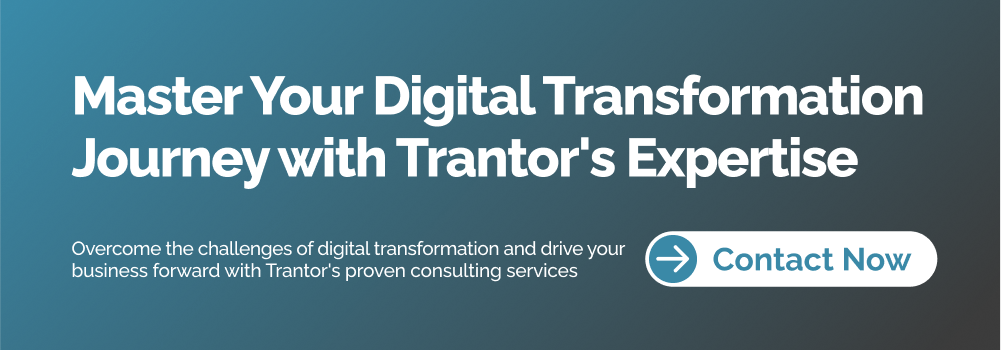CSaaS, zBlog
12 Digital Transformation Challenges to Overcome in 2025
atif | Updated: November 25, 2024

Introduction
As we approach 2025, digital transformation continues to be a priority for organizations worldwide. The adoption of advanced technologies and the shift towards digital-first business models have accelerated, but this journey comes with a series of challenges. Companies face obstacles that range from technical and operational issues to cultural resistance and skills gaps. Overcoming these challenges is crucial for businesses aiming to stay competitive and drive innovation in the years to come.
In this blog, we will explore the 12 key Digital Transformation Challenges that businesses are likely to face in 2025 and provide insights on how to overcome them.
Organizations like Trantor, with their expertise in Digital Transformation Consulting, help businesses navigate these challenges and implement successful digital transformation strategies.
1. Cultural Resistance to Change

One of the biggest hurdles in any digital transformation initiative is resistance to change. Employees who are accustomed to traditional ways of working may feel threatened by new technologies and processes. This resistance can slow down the adoption of digital tools and hinder the success of transformation efforts.
Solution:
To overcome cultural resistance, it’s essential to foster a culture of innovation and openness. Leadership should communicate the benefits of digital transformation clearly and involve employees in the process. Training programs and workshops can also help bridge the knowledge gap and make the transition smoother.
2. Lack of Digital Skills

The rapid advancement of technologies such as artificial intelligence (AI), cloud computing, and the Internet of Things (IoT) requires a workforce with the necessary digital skills. However, many organizations face a shortage of skilled professionals who can manage and implement these technologies effectively.
Solution:
Investing in upskilling and reskilling programs is essential for closing the digital skills gap. Partnering with Digital Transformation Consulting firms like Trantor can also help businesses access external expertise to support their digital initiatives.
3. Legacy Systems and Infrastructure

Many organizations are still operating on outdated legacy systems that are incompatible with modern digital tools. These systems can be difficult and costly to update, hindering digital transformation efforts.
Solution:
A phased approach to upgrading legacy systems can help mitigate the costs and risks associated with large-scale migrations. Companies should also explore hybrid solutions, where old and new systems can coexist during the transformation process.
4. Data Security and Privacy Concerns

With the increasing reliance on digital tools, data security and privacy have become critical concerns. Cyberattacks and data breaches can lead to significant financial losses and damage to a company’s reputation, making security a top priority in digital transformation.
Solution:
Implementing strong cybersecurity measures, such as encryption, multi-factor authentication, and Zero Trust Architecture, can help protect sensitive data. Partnering with Digital Transformation Consulting firms that specialize in cybersecurity, like Trantor, can ensure that businesses are well-equipped to manage these risks.
5. Unclear Vision and Strategy

A lack of a clear digital transformation strategy can lead to confusion and misalignment across departments. Without a defined roadmap, organizations may struggle to prioritize initiatives and allocate resources effectively.
Solution:
To overcome this challenge, businesses must develop a comprehensive digital transformation strategy that aligns with their overall goals. This strategy should include specific objectives, timelines, and metrics for measuring success. Consulting firms like Trantor can assist in developing and refining these strategies to ensure they are aligned with the organization’s needs.
6. Difficulty in Integrating New Technologies

Digital transformation often involves the integration of multiple new technologies, which can be a complex and time-consuming process. Ensuring that these technologies work seamlessly together with existing systems is a common challenge.
Solution:
Investing in scalable and flexible digital solutions that can integrate with existing infrastructure is key to overcoming this challenge. Companies should also ensure that their IT teams are equipped with the knowledge and skills to manage complex integrations or consider outsourcing this function to a Digital Transformation Consulting partner.
7. Insufficient Budget and Resources

Many organizations underestimate the cost and resources required for a successful digital transformation. Budget constraints can limit the scope of transformation initiatives, preventing businesses from fully leveraging the potential of new technologies.
Solution:
Organizations should conduct a thorough assessment of their digital transformation needs and budget accordingly. By breaking down the transformation process into manageable phases, companies can allocate resources more effectively. Additionally, partnering with consulting firms like Trantor can help optimize budgets and ensure maximum return on investment.
8. Inconsistent Leadership Support

Leadership buy-in is crucial for the success of digital transformation initiatives. Without consistent support from senior leadership, it becomes challenging to secure the necessary resources and align the organization toward common goals.
Solution:
Leaders must take an active role in championing digital transformation initiatives. Regular communication, progress updates, and demonstrating the long-term benefits of transformation can help ensure leadership support remains strong throughout the process.
9. Change Management Issues

Digital transformation requires organizations to rethink traditional processes and workflows. However, managing the change that comes with adopting new technologies can be overwhelming, especially for larger organizations.
Solution:
Implementing a structured change management process is essential to minimize disruptions during digital transformation. This involves communicating the reasons for the change, training employees on new tools and processes, and providing ongoing support. Partnering with Digital Transformation Consulting experts can also make this transition smoother.
10. Lack of Agility

The rapid pace of technological advancement means that organizations need to be agile to adapt to new opportunities and challenges. However, many businesses struggle with agility due to rigid organizational structures and slow decision-making processes.
Solution:
To become more agile, companies should adopt lean, flexible processes and encourage a culture of experimentation. This can be achieved by breaking down silos, encouraging cross-functional collaboration, and empowering teams to make decisions quickly. Trantor can help organizations develop an agile approach to digital transformation, enabling them to respond to market changes more effectively.
11. Customer Experience Overhaul

Customer expectations are higher than ever before, and businesses must provide seamless, personalized experiences across all digital touchpoints. Failing to meet these expectations can result in lost revenue and decreased customer loyalty.
Solution:
Businesses should prioritize customer experience in their digital transformation strategy. Leveraging data analytics and AI to gain insights into customer behavior can help create personalized experiences that meet customer expectations. Trantor’s expertise in digital customer experience can assist businesses in designing and implementing customer-centric digital solutions.
12. Measuring Success

Measuring the success of digital transformation initiatives can be difficult, especially when there are multiple objectives and complex technological implementations involved. Without clear metrics, it becomes challenging to determine whether the transformation is delivering value.
Solution:
Organizations should establish key performance indicators (KPIs) at the outset of their digital transformation journey. These KPIs should be aligned with the organization’s goals and provide a clear picture of progress. Regular reviews and adjustments to the strategy will help ensure that the digital transformation is on track to deliver its intended benefits.
Conclusion
Digital transformation offers immense opportunities for businesses to stay competitive and innovate, but it also comes with its fair share of challenges. Addressing these challenges head-on is crucial for success in 2025 and beyond. From overcoming cultural resistance to managing complex technology integrations, businesses must develop comprehensive strategies to ensure a smooth and effective transformation.
Partnering with Trantor, a leader in Digital Transformation Consulting, can help businesses navigate these challenges and ensure they are well-prepared for the future. With expert guidance, companies can overcome obstacles, maximize the benefits of digital transformation, and maintain a competitive edge in an ever-evolving market.




